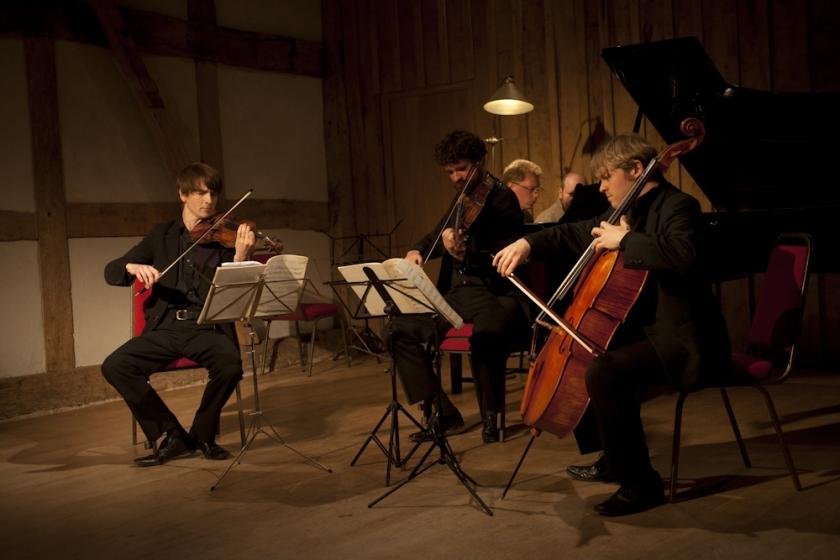The Wye valley is famous for its scenery and coach parties: Symonds Yat, Tintern Abbey, Goodrich Castle, salmon fishing, leaves in autumn etc. etc. But in mid-winter all that is dead. Instead, this month as for the past dozen or so Januaries, the woods and waters will echo to the sound of chamber music, played by some of the most brilliant young musicians in the country.
The Wye Valley Chamber Music Festival was started by pianist Daniel Tong (pictured below right) and violinist Fiona McNaught as a kind of winter camp for a handful of young professional musicians, who took over St Briavel’s Castle for a week at New Year in order to play chamber music for their own pleasure, away from the grind of London concert-giving. They came at their own expense, cooked their own meals, shivered amid the damp stonework of this underheated youth hostel, and eventually did what musicians will always do in the end: gave concerts to share their pleasure with the cultivated but far from over-provided denizens of this tranquil border region.
 One concert became two, three, four, eventually five or six. The week became a festival, looked forward to with impatience by friends and supporters. This year it covers two weekends, from 14 to 22 January, and has evolved into a richly complex event, with talks and workshops as well as concerts, and music ranging from Schubert’s Winterreise to songs by Janáček, and from Mendelssohn’s D major quartet to Thomas Adès’s Arcadiana. There’s an “Elgar Day” and a “Discovery Day” devoted this year to Czech music. Bartók’s first string quartet is teamed with quintets by Brahms and Dohnányi, and rare fragments of Liszt.
One concert became two, three, four, eventually five or six. The week became a festival, looked forward to with impatience by friends and supporters. This year it covers two weekends, from 14 to 22 January, and has evolved into a richly complex event, with talks and workshops as well as concerts, and music ranging from Schubert’s Winterreise to songs by Janáček, and from Mendelssohn’s D major quartet to Thomas Adès’s Arcadiana. There’s an “Elgar Day” and a “Discovery Day” devoted this year to Czech music. Bartók’s first string quartet is teamed with quintets by Brahms and Dohnányi, and rare fragments of Liszt.
The atmosphere will be, as it has always been, warm and intimate, but musically intense and concentrated. The players make no concessions to the fact that they still come without fee simply because they love coming. Some of the best performances I can remember of Mozart quintets, late Beethoven quartets and Schubert trios have emerged from the chilly vaults of St.Briavel’s and, more recently, the somewhat less spartan chambers of Treowen Manor, near Monmouth, where the musicians now sleep, eat and rehearse. What seems to count most is the opportunity in this environment to take a completely new look at familiar as well as unfamiliar masterpieces and rethink them collectively, since for most of the year these players are not performing together. Even when the performances are (rarely) less than totally immaculate, they have a freshness that completely evades the weary concept of repertory.
If this reads like a promotional flier, then let it. I’m chairman of the trust that oversees the festival, and I sometimes give talks, but I have hardly anything to do with the programming and absolutely nothing to do with the music-making. I sit and enjoy it like everyone else. We crowd into the smallish music-room at Treowen or the tiny church at St Briavel’s; we occupy the converted barn of the exquisite Tudor manor of Hellens at Much Marcle, or the great hall of Hereford Bishop’s Palace. And we wonder how we survived without this annual fix.
- The Wye Valley Festival runs from January 14 to 22














Add comment